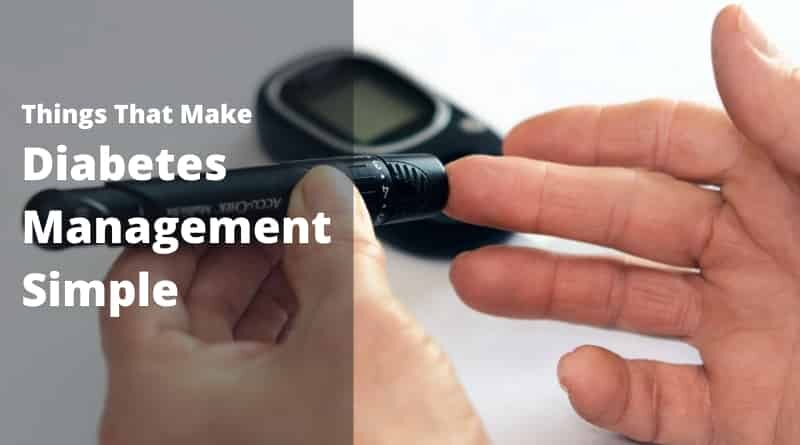7 Things That Make Diabetes Management Simple
Dedicated diabetes management is critical to keeping your symptoms in check, preventing long-term damage, and keeping you out of a hospital gown when possible. While it may sound daunting, some of the most effective diabetes management strategies are lifestyle changes that will become a habit with practice.
Table of Contents
Diabetes Management
If you’re wondering where to get started, here are seven techniques that make diabetes management simple:
Get to know your carbs.
You’ve probably heard a lot about the connection between diabetes and sugar, but what do you know about carbs? While you definitely need to watch your sugar intake, you also need to monitor your carbohydrate consumption, especially refined carbs such as white bread.
That’s because your body quickly processes carbohydrates and converts them into even more sugar, which can cause your blood glucose levels to spike. Learn how your body processes different carbohydrates and what portion sizes are most appropriate for each type of carb. What kinds of carbs you eat — and how much — will have the most significant impact on your blood sugar levels.
Eat a balanced diet.
Just because you need to pay more attention to carbs doesn’t mean that you can ignore the rest of your diet. Every meal should be a mix of starches, fruits and vegetables, proteins, and healthy fats if possible. Make sure that you watch your fat and sugar intake and don’t go overboard on them.
Talk to your doctor about what kinds of foods you should be incorporating into your diet. If you take diabetes medication with your meal, they will also help you figure out which types of foods and which portions will play nicely with your medication to keep your blood sugar from dipping too low or rising too high.
Watch what you drink.
People with diabetes are at increased risk for dehydration because high blood glucose levels can trigger dehydration. As a result, drinking plenty of water throughout the day is extremely important for people with diabetes. They should also limit or avoid regular consumption of sugary beverages such as fruit juice and soda, and alcohol. Unlike food, your body doesn’t have to digest drinks, so they can quickly cause your blood sugar to spike out of control if it’s already normal. On the other hand, these beverages can be a quick remedy for super low blood sugar levels, so keeping a small bottle of fruit juice on hand may be helpful.
Get moving regularly.
Your body converts glucose to energy, so when you exercise, you burn through extra blood sugar. A consistent exercise routine will also help train your body to use insulin more efficiently. Talk to your doctor about what kinds of exercises are most appropriate for you and how often you need to be exercising. They will probably recommend that you aim for at least 30 minutes of moderate exercise on most days of the week.
They may also recommend that you monitor your blood sugar levels before, during, and after exercise, as exercise can lower your glucose even up to a day later. Always look out for the signs of low blood sugar and stop exercising if you feel shaky, weak, dizzy, or confused. If you have diabetic foot problems, you may wish to get some shoes for swollen feet, specifically exercising.
Follow your treatment plan.
While diet is usually the most important way to manage diabetes, your doctor may also recommend medication or other medical interventions. Make sure to follow their instructions for taking your medication and not to skip or delay doses. Consistency is vital when it comes to managing diabetes. Insulin is also very sensitive to extreme temperatures, so it must be stored properly to remain effective. Before trying a new medication, even an over-the-counter one, ask your provider how it might affect your blood sugar levels. Keep up with your regular doctor’s appointments. You may also need to see podiatrists or neurologists check for nerve damage as well.
Read: DIABETIC NEUROPATHY TREATMENT
Monitor your menstruation.
Did you know that the hormone fluctuation around menstruation can affect your blood sugar levels? It’s true! Monitoring your glucose levels before, during, and after your period will help you establish patterns and learn how you might need to vary your medications or diet. If you’re at the age where you might be approaching menopause, always check low sugar levels before treating them. The symptoms of menopause overlap somewhere with low blood sugar, so just because you feel like you have low blood sugar doesn’t necessarily mean that you do.
Manage your stress.
Stress, especially chronic stress, causes your body to release hormones that can elevate your blood sugar levels. Stressful situations can also make it hard to stick to a consistent diabetes care routine, and you may find yourself skipping exercise, forgetting medication doses, and eating lots of refined carbs when you’re under a lot of pressure. If you know that you have a stressful event coming up, try to work ahead and get as much done in advance as possible.
You may want to log your stress level in tandem with your blood sugar to get a correlation. Try to stick with your diabetes management as much as possible. (In fact, exercise can be a great stress reliever, so grab your diabetic footwear and go for a walk!) Learn what coping strategies work for you, and don’t be afraid to delegate to other people.
Keep your diabetes in check with these seven simple lifestyle tips. While it does take active work, you can still have an excellent quality of life with diabetes if you’re willing to stick with these healthy habits.




